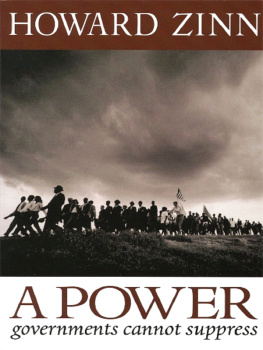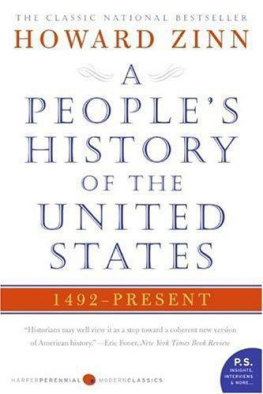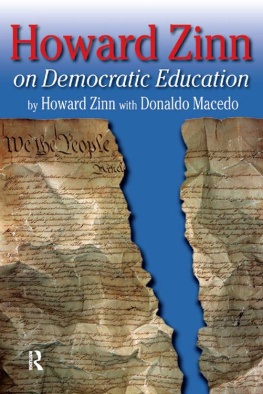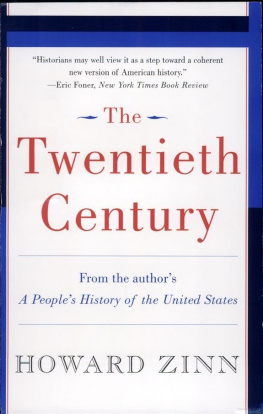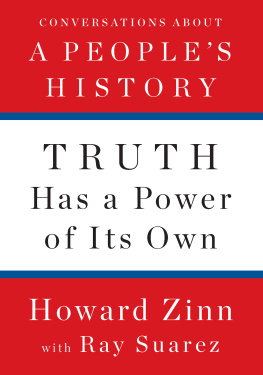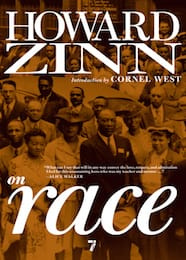Howard Zinn - A Power Governments Cannot Suppress
Here you can read online Howard Zinn - A Power Governments Cannot Suppress full text of the book (entire story) in english for free. Download pdf and epub, get meaning, cover and reviews about this ebook. year: 2006, publisher: City Lights Publishers, genre: Politics. Description of the work, (preface) as well as reviews are available. Best literature library LitArk.com created for fans of good reading and offers a wide selection of genres:
Romance novel
Science fiction
Adventure
Detective
Science
History
Home and family
Prose
Art
Politics
Computer
Non-fiction
Religion
Business
Children
Humor
Choose a favorite category and find really read worthwhile books. Enjoy immersion in the world of imagination, feel the emotions of the characters or learn something new for yourself, make an fascinating discovery.
- Book:A Power Governments Cannot Suppress
- Author:
- Publisher:City Lights Publishers
- Genre:
- Year:2006
- Rating:4 / 5
- Favourites:Add to favourites
- Your mark:
A Power Governments Cannot Suppress: summary, description and annotation
We offer to read an annotation, description, summary or preface (depends on what the author of the book "A Power Governments Cannot Suppress" wrote himself). If you haven't found the necessary information about the book — write in the comments, we will try to find it.
A Power Governments Cannot Suppress is a major collection of essays on American history, race, class, justice and ordinary people who stand up to power. Zinn approaches the telling of U.S. history from an active, engaged point of view, drawing upon untold histories to comment on the most controversial issues facing us today: government dishonesty, terrorism, the wars on Iraq and Afghanistan, the loss of our liberties, immigration and the responsibility of the citizen to confront power for the common good. A Power Governments Cannot Suppress is an invaluable post-9/11 era addition to the themes that run through Howard Zinns bestselling classic, A Peoples History of the United States.
Thank you, Howard Zinn. Thank you for telling us what none of our leaders are willing to: The truth. And you tell it with such brilliance, such humanity. It is a personal honor to be able to say I am a better citizen because of you.Michael Moore, director of Fahrenheit 9/11
This strong, incisive book by Howard Zinn provides us with a penetrating critique of current U.S. policies and embraces the sweep of history. . . . A Power Governments Cannot Suppress leaves us with the faith that citizens have what it takes to confront power and to reverse the dangerous and unjust acts of our government.Jonathan Kozol, author of The Shame of the Nation: The Restoration of Apartheid Schooling in America
Find here the voice of the well-educated and honorable and capable and humane United States of America, which might have existed if only absolute power had not corrupted its third-rate leaders so absolutely.Kurt Vonnegut, author of A Man Without a Country
Howard Zinn is a unique voice of sanity, clarity, and wisdom who reads history not only to understand the present but to shape the future . . . . Profoundly insightful . . . A Power Governments Cannot Suppress should be read by every American, over and over again.Michael Lerner, editor of Tikkun Magazine
Zinn writes with an enthusiasm rarely encountered in the leaden prose of academic history. . .New York Times Book Review
Zinn collects here almost three dozen brief, passionate essays that follow in the tradition of his landmark work, A Peoples History of the United States . . . Readers seeking to break out of their ideological comfort zones will find much to ponder here.Publishers Weekly
Howard Zinn is an acclaimed historian, playwright, and combat veteran of World War II. He is the author of more than two dozen books, including his masterpiece A Peoples History of the United States, and The Historic Unfulfilled Promise (City Lights).
Howard Zinn: author's other books
Who wrote A Power Governments Cannot Suppress? Find out the surname, the name of the author of the book and a list of all author's works by series.

